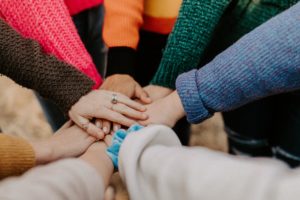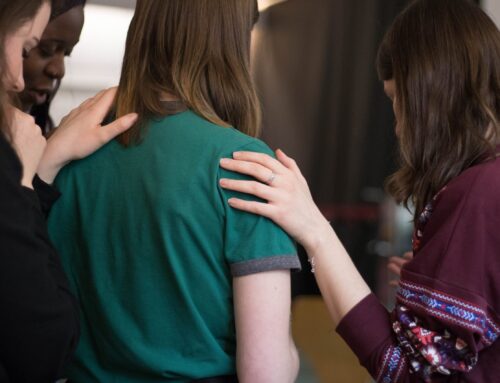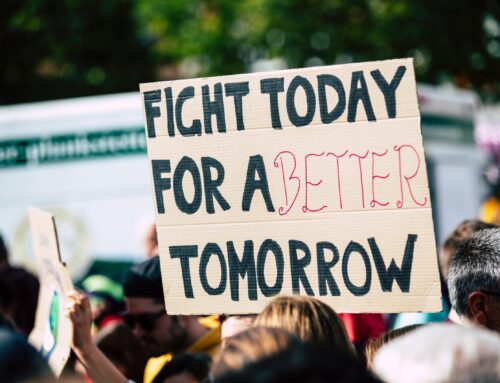
This recent (that is, once, current, and future) pandemic has challenged the assumptions, methods, and practices of that individual approach by elevating concern about the health and welfare of others.
Precautions and protocols to reduce the likelihood of transmission of COVID-19 emphasized risks to others as much, or more, than to oneself. Masks, in fact, provide more protection for others than for oneself; the same is largely true of social distancing, avoiding crowds, reducing the capacity of spaces, limiting participation in some sports, and restricting singing and other forms of music performance. Vaccines provided the first primarily personal risk reduction opportunity—but when considered on a population basis, even vaccines (i.e., the percentage of people who have been vaccinated) have a collective purpose that transcends their immediate and personal benefits.
The importance of protecting others has been the fundamental foundation for vaccine requirements (and for limiting exemptions to those requirements), mask mandates, quarantine and isolation spaces, and online learning. Protecting others has justified demanding and enforcing behavior changes and certain actions by individuals—and it is in that collective, or community, or public health perspective that there has been, and continues to be, great controversy on the point of individual rights and self-governance. In many states, legislatures and/or governors have forbidden or overturned vaccine requirements or mask mandates on grounds that they violate individual freedom of choice, regardless of the benefits of those actions at community or population levels. In those states, the ability to “choose your own adventure” in the pandemic has been costly to individual lives and to community resources; since vaccines became widely available, unvaccinated people have dominated hospital admissions, transfers to intensive care units, and deaths from COVID-19.
So it is that the collision between the principles of public health and the politics of individual rights has ignited fierce debates from state capitols to college and university cabinet meetings.
In higher education, protests against vaccine requirements have sometimes been so strident that administrators have worried about the consequences of such requirements to the enrollment and retention of students.
Protests on similar political grounds have, throughout recent history, slowed or prevented the implementation of public health measures that would have saved many lives; clean air acts, seat belt requirements, and prohibitions on using cell phones or texting while driving are examples. The conceptual thread among successful campaigns to require individuals to do, or not do, certain things has been the degree of potential harm done to others by those actions or failures to act; prohibitions related to tobacco abuse are in place only insofar as smokers endanger the health and well-being of others (hence no smoking on commercial airliners, or in restaurants and bars). But that public health framework that highlights the possibility of harm to others shows little promise now, in the case of what is widely believed to be a fading, disappearing pandemic.
Pandemic fatigue—and related precaution fatigue, including vaccine and mask fatigue—is well established now, even in parts of the country in which an ethic of community had recently prevailed.
There is virtually no enthusiasm for the resumption of any form of mandated behavior, except, and in only a limited sense, vaccination; most—but not all—institutions that required COVID-19 vaccines as a condition of enrollment seem likely to continue that requirement for entering students at the beginning of the 2022/2023 academic year. But there is no real consensus about boosters, or, eventually, second boosters. Mask mandates have become anathema; many campuses declare instead that they are “mask-friendly,” and some struggle to resolve the question of “host-required” masking in classrooms or offices when a faculty or staff member insists on it.
The pandemic, which is absolutely oblivious to these human attitudes and actions, nonetheless continues. Every infection is an opportunity for not only more infections among others, but also the spinning out of yet another new variant, with a different profile of infectiousness and severity. Higher education, and the communities that house colleges and universities, of course must go on; future prospects, while uncertain, are not hopeless. And hope, while not a strategy in public health any more than is true in other areas of life, rests on the presumption—somewhat, though not entirely, justified in science—that we have entered an endemic future in which lots of people will get COVID-19 but most of them will not be seriously ill as a result. We may have 100,000 cases per day, but rates of hospitalization have not climbed high. For now.
The point of this reflection arises in relation to other emerging conflicts in the realm of personal and public health concerns. Enter monkeypox, for example; not a new virus, but newly established as a cause of disease in Europe and the US, and not yet, but arguably soon to be, qualified as a pandemic as well. The means of transmission brings monkeypox to the center of the personal versus collective risk debate; since close skin-to-skin contact is required, groups of people packed together in limited spaces and intimate contacts are most at risk. What any individual does might affect the health of one, or many, other individuals. Most currently recognized cases have been among men who have sex with men; while it is unlikely that the same pattern will continue to the same extent, it could fuel even more of the recent legislative and executive assaults on the rights and status of gay and bisexual people. Society has a troubling history of thinking of certain infections as “gay diseases,” HIV being the most obvious example. Practically speaking, monkeypox will come to campus; health centers will encounter the worried well, the recently exposed, and the infected and sick. Essential this fall will be readiness to serve those students, including access to monkeypox testing, vaccines, and antiviral medication; since the incubation period (typically 14 days or more) is so long, timely vaccination can protect an exposed person from developing the illness.
Campus health and counseling centers will, however, encounter a much more difficult challenge this fall: students who no longer have access to certain reproductive health services, especially trans care and abortion.
Here, the usual recent “logic” of individual and collective risk seems not to apply; the decision of the Supreme Court to overturn Roe v. Wade, and the actions of state legislatures and governors to restrict or eliminate access to abortion, will likely remove any protection for individual choice for women in nearly half the states. Strangely, then, in those states it is not permissible to require COVID-19 vaccinations, but it is permissible to require women to carry a pregnancy to term (even if doing so might endanger her health), and it may also be permissible to refuse to provide contraception, or to deny care to trans persons.
The Supreme Court’s decision, and the legislation and executive orders put in place in many states, will complicate plans on many campuses to develop health-promoting universities with an inclusive and caring spirit.
What the Court’s decision and new state laws will not prevent is students coming to health and counseling centers with unwanted pregnancies, or in need of reproductive health services that healthcare professionals may be forbidden to provide. Our own beliefs, values, and attitudes about gender, reproductive health, or abortion will not keep those students from coming to us, either—unless we advertise to students our unwillingness to assist them. If they have trusted us, they will come; if they have not trusted us, we have another, very different, and truly terrible problem to solve.
Those students will need help. They will need empathy, not judgment. There will be students who come to us because their health—and lives—have been endangered by an illegal abortion, or because their despair has driven them to thoughts of suicide. Finding ways to help them may be challenging for some of us or our colleagues, and will be especially difficult in places where legal and regulatory restrictions endanger access to or the provision of reproductive health services. Help may mean different things in different settings. But just as we have to be prepared for whatever the pandemic of COVID-19 might bring, or for the questions and needs students might have about monkeypox, we must be prepared to help those students, as well. Most of them will not be happy that they have to be in front of us asking for help. Especially when law and social policy are not humane, we must be all the more humane. As always, students first.
Richard P. Keeling, MD, Chairman, wrote this essay for the Council for the Advancement of Standards in Higher Education (CAS) and presented it at their Council of Representatives meeting on July 18, 2022.
Keeling & Associates, LLC is a comprehensive higher education consulting and professional services firm that creates “change for learning” through its strategic planning, consultation, and executive search services across North America. Let’s create change for learning together.






Leave A Comment